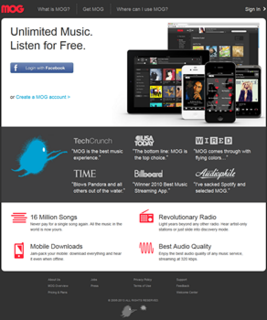Related Research Articles

The iTunes Store is a software-based online digital media store operated by Apple Inc. that opened on April 28, 2003, as a result of Steve Jobs' push to open a digital marketplace for music. As of April 2020, iTunes offers 60 million songs, 2.2 million apps, 25,000 TV shows, and 65,000 films. When it opened, it was the only legal digital catalog of music to offer songs from all five major record labels. As of June 2013, the iTunes Store possessed 575 million active user accounts, and served over 315 million mobile devices.

A digital music store is a business that sells digital audio files of music recordings over the Internet. Customers gain ownership of a license to use the files, in contrast to a music streaming service, where they listen to recordings without gaining ownership. Customers pay either for each recording or on a subscription basis. Online music stores generally also offer partial streaming previews of songs, with some songs even available for full length listening. They typically show a picture of the album art or of the performer or band for each song. Some online music stores also sell recorded speech files, such as podcasts, and video files of movies.
Hot Topic is a retail chain specializing in counterculture-related clothing and accessories, as well as licensed music. The stores are aimed towards an audience interested in rock music and video gaming, and most of their audience ranges from teens to young adults. Approximately 40% of Hot Topic's revenue comes from sales of licensed band T-shirts. Hot Topic often negotiates exclusive licensing arrangements with musical artists, movie studios, and graphic artists. The majority of the stores are located in regional shopping malls.
ARTISTdirect is an American online digital media entertainment company.

Bleep is an online independent record shop that mainly showcases music from independent artists and labels. Created by Warp Records and launched in January 2004, Bleep offers single tracks and whole albums as both digital and physical purchases, the latter including vinyl records, compact cassettes and CDs. All music they sell is free of digital rights management (DRM) technologies. They also sell DVDs, clothing, and other merchandise from a variety of labels and designers.
Xbox Games Store is a digital distribution platform used by Microsoft's Xbox One and Xbox 360 video game consoles. The service allows users to download or purchase video games, add-ons for existing games, game demos along with other miscellaneous content such as gamer pictures and Dashboard themes.
Podcasting, previously known as "audioblogging", has its roots dating back to the 1980s. With the advent of broadband Internet access and portable digital audio playback devices such as the iPod, podcasting began to catch hold in late 2004. Today there are more than 115,000 English-language podcasts available on the Internet, and dozens of websites available for distribution at little or no cost to the producer or listener.

Zune is a line of digital media products and services marketed by Microsoft from November 2006 until its discontinuation in June 2012. Zune consisted of a line of portable media players, digital media player software for Windows PCs, a music subscription service known as a "Zune Music Pass", music and video streaming services for the Xbox 360 game console via the Zune Software, music, TV and movie sales, and desktop sync software for Windows Phone. Zune was also the provider of music streaming for United Airlines in-flight, after a partnership in 2010.

MOG was a paid subscription online music service and blog network, where subscribers could listen to and read about music. Subscribers could play tracks available in its catalog on a variety of digital devices, including computers, handheld devices, Sonos systems and television. MOG also allowed users to access aggregated editorial content from music blogs, user posts, and in-house editors.
The online service imeem was a social media website where users interacted with each other by streaming, uploading and sharing music and music videos. It operated from 2003 until 2009 when it was shut down after being acquired by MySpace.
Digital music stores sell copies of digital audio, for example in MP3 and WAV file formats. Unlike music streaming services, which typically charge a monthly subscription fee to stream digital audio, online music stores download songs to the customer's hard disk drive of their device. The customer will have the copy of the song permanently on their disk, provided the track is not deleted by the customer, the disk does not get physically damaged, or suffers from being corrupted. Major examples of online music stores include iTunes Store, Amazon Music, Bandcamp and 7digital.
PassAlong Networks, also known as Tennessee Pacific Group, LLC, was a developer of digital media innovations and services located in Franklin, Tennessee. The company had a digital music library of three million licensed songs, two million of which were raw MP3 music files, and provided a series of products and services in the digital media marketplace.

Ovi by Nokia was the brand for Nokia's Internet services. The Ovi services could be used from a mobile device, computer or via the web. Nokia focused on five key service areas: Games, Maps, Media, Messaging and Music. Nokia's aim with Ovi was to include third party developers, such as operators and third-party services like Yahoo's Flickr photo site. With the announcement of Ovi Maps Player API, Nokia started to evolve their services into a platform, enabling third parties to make use of Nokia's Ovi services.

Amazon Music is a music streaming platform and online music store operated by Amazon. Launched in public beta on September 25, 2007, in January 2008 it became the first music store to sell music without digital rights management (DRM) from the four major music labels, as well as many independents. All tracks were originally sold in 256 kilobits-per-second variable bitrate MP3 format without per-customer watermarking or DRM; however, some tracks are now watermarked. Licensing agreements with recording companies restrict the countries in which the music can be sold.
7digital Group Plc is a British publicly listed company that offers access to music, tracking and reporting for clients. Advertising Age described 7digital in 2008 as a "British download store." During the 2010s, the New York Times referred to them as "a digital music company in Britain." 7digital's Smooth Operations, Unique Production and Above The Title companies are now branded 7digital Creative, and produce content for BBC Radio 1, Radio 1Xtra, BBC Radio 2 and BBC Radio 3. In 2009 HMV bought 50% of 7digital. In 2019, the company replaced their second CEO, Simon Cole, who had replaced founder/CEO Ben Drury.
OverDrive, Inc. is a digital distributor of eBooks, audiobooks, online magazines, and streaming video titles. The American company provides secure digital rights management and download fulfillment services for publishers, libraries, schools, corporations, and retailers.
In the first decade of the 21st century, the rise of digital media on the internet and computers as a central and primary means to record, distribute, store, and play music caused widespread economic changes in the music industry. The rise of digital media with high-speed internet access fundamentally changed the relationships between artists, record companies, promoters, retail music stores, the technology industry, and consumers. The rise of digital music consumption options contributed to a several fundamental changes in consumption. One significant change in the music industry was the remarkable decline of conventional album sales on CD and vinyl. With the A la carte sales models increasing in popularity, consumers no longer download entire albums but rather choose single songs.

SoundCloud is a Swedish-founded online audio distribution platform and music sharing website based in Berlin, Germany, that enables its users to upload, promote, and share audio, as well as a digital signal processor enabling listeners to stream audio. Started in 2007 by Alexander Ljung and Eric Wahlforss, SoundCloud has grown to be one of the largest music streaming services. SoundCloud offers both free and paid membership on the platform, available for desktop and mobile devices.
Didiom was a digital media company that specialized in the development of streaming media applications and wireless content delivery platforms. Built on peer-to-peer placeshifting technology, the company's flagship product allowed customers to stream their home computer's audio collection to their phone wirelessly, eliminating the need for data cables and memory cards. With two million songs under its management, Didiom previously launched an on-device music store that allowed customers to name their own prices for music downloads. In February 2011, Didiom was acquired by SnapOne, Inc.
The following outline is provided as an overview of and topical guide to Apple Inc.:
References
- ↑ Levine, Robert (June 30, 2008). "A Digital Music Store That Sells More Than Just MP3s". The New York Times.
- ↑ [ permanent dead link ]
- ↑ Hot Topic, Inc. Launches Shockhound, New All-In-One Music Site, Gulf Coast Bands, October 30, 2008
- ↑ "A Very Important Announcement from Shockhound". Shockhound. Archived from the original on April 2, 2011. Retrieved 2011-03-28.
- ↑ "Hot Topic (HOTT) to Discontinue Shockhound.com Operations; Sees Qtr. Charge of 21c/Share, Updates Q1, FY12 Outlook; Stock Halted". StreetInsider.com. March 28, 2011.
- ↑ "ShockHound Takes West Coast By Storm With Free Snow Patrol Shows". Reuters (Press release). November 18, 2008. Archived from the original on January 11, 2009.
- ↑ A digital music store that sells more than MP3s, June 30, 2008
- ↑ [ permanent dead link ]
- ↑ Shockhound Presents: Snow Patrol
- ↑ [ permanent dead link ]